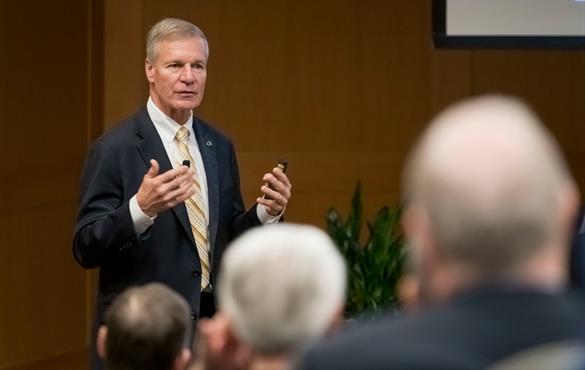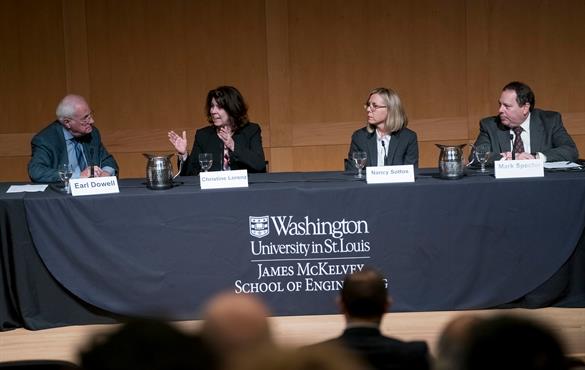Engineering education needs to create innovation in everything, Peterson says
Engineering schools need to create innovation in everything they do, said G.P. “Bud” Peterson at the Jubel Symposium Oct. 25

Higher education is undergoing a transformation in how we view and think about it. Previously, people thought an educated population was good for the nation, but today, it's a personal benefit for the individual, said G.P. "Bud" Peterson, president emeritus and Regents Professor in the Woodruff School of Mechanical Engineering at the Georgia Institute of Technology.
Peterson was the keynote speaker at the Oct. 25 symposium celebrating the opening of Henry A. and Elvira H. Jubel Hall, the recently completed building that houses the Department of Mechanical Engineering & Materials Science on the East End of Washington University in St. Louis' campus. A gift from the Henry A. Jubel Foundation funded Jubel Hall, which contains classrooms, laboratories, faculty offices, gathering and study areas and the Spartan Light Metal Products Maker Space. In this building, mechanical engineers will work closely with physicists, chemists, biologists and chemical and biomedical engineers to promote the convergence of mechanics, materials science and nanotechnology.
"A few weeks ago we dedicated this building during an event that celebrated the many donors and campus leaders who helped make possible Jubel Hall and the other buildings East End Transformation," said Aaron Bobick, dean of the McKelvey School of Engineering and the James M. McKelvey Professor, to open the session. "Today we, the McKelvey Engineering community at Washington University, celebrate the discipline and opportunity that is Engineering. It is about the future. Our future."
Peterson focused on the state of higher education.
"What can higher education change?" Peterson asked. "We need to teach students to think critically, and we need to create innovation in everything that we do. We need to help students understand how to take massive amounts of information and create knowledge."
There are numerous policy implications of these changes, Peterson said, including transparency, privacy and ethics, accuracy and addressing the "digital divide" by providing access to broadband to rural communities.
The advantages to in-person higher education, compared with online programs, include a culture of innovation in teaching, creating a culture of globalization, innovation in research and economic development, Peterson said.
Innovation was a theme in the panel discussion, which included Earl Dowell, former dean of the School of Engineering at Duke University; Christine Lorenz, chief operating officer of Cohesic Inc. and a Washington University alumna; Nancy Sottos, the Donald B. Willet Professor of Engineering in the Department of Materials Science and Engineering and the Beckman Institute at the University of Illinois Urbana-Champaign; and Mark Spector, program officer in the Advanced Naval Platforms Division at the Office of Naval Research.

(From left) Earl Dowell, Christine Lorenz, Nancy Sottos, and Mark Spector comprised a panel that discussed the future of mechanical engineering.
Photo by Whitney Curtis.
"I see my job as an investor in innovation," Spector said. "The challenge we face is the security field is the pace of innovation we see. A lot of what we're doing is figuring out how we respond to rapidly increasing innovation and technological advances as we now face peer and nonpeer competitors in the global space that we haven't faced since the Sputnik era."
Lorenz, who was an associate professor of medicine at WashU's School of Medicine from 1995-2000, addressed how innovation can improve health care.
"The biggest challenge I see having worked in hospitals is that it's like trying to force a high-tech aircraft engine into a horse-drawn cart," said Lorenz, who earned a bachelor's degree in mechanical engineering from WashU in 1986. "Engineering could help with uncovering maybe not the most glamorous problems in the hospital, but there is a lot to be done with the infrastructure. There are challenges in infection control in hospitals with superbugs, in materials research, and ways to keep patients out of hospitals in the first place."
In addition, the panelists addressed the need for more diversity and participation by students from underrepresented groups in the engineering field. Sottos said she has faced the issue for her whole career as a woman in materials science.
"One thing that's important for increasing participation is that the price of education is insane now for most people," she said. "Engineering is a particularly expensive endeavor of education. Focusing on scholarships and financial aid is critical."
Dowell said engineering education is key to advancing innovation.
"Being at Washington University is a great place to start, certainly in aerospace," Dowell said. "If you have a first-class education, the world is your oyster. There are only about 2 million engineers in the country. We are the ones who drive the system."



